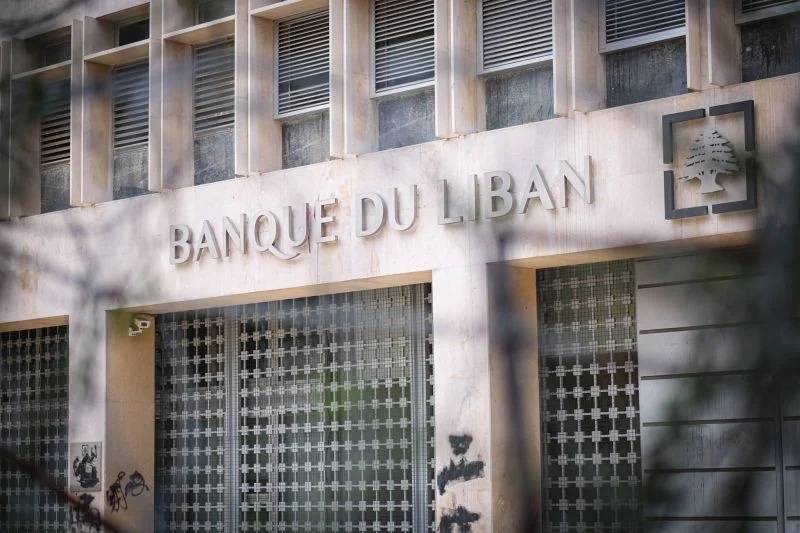
The Banque du Liban headquarters in Beirut. (Credit: João Sousa/L'Orient Today)
Parliament is scheduled to reconvene next Thursday for an eighth attempt to elect a president after yet another protest ballot majority during yesterday’s single round of voting. A portion of the 110 MPs present at the start of the session left after the first round of voting — during which 86 votes, representing two-thirds of Parliament’s 128 MPs, are needed in order to elect a president — causing Parliament to lose quorum and preventing subsequent rounds during which successful candidates only need a simple majority of 65 votes. Yesterday’s results were consistent with previous sessions: frontrunner Zgharta MP Michel Moawad received 42 votes, 50 MPs cast blank ballots and the remainder wrote in unlikely candidates and patriotic slogans. “This is not an election anymore, this is an intermission,” Kataeb MP Sami Gemayel said after the session, criticizing what he sees as a waiting period until MPs reach consensus on a candidate ahead of actually casting their votes. Parliament Speaker Nabih Berri said he would intervene to mediate dialogue among MPs if the political stalemate persists past the New Year.
The Constitutional Council upheld two appeals to the May parliamentary election results, replacing an independent MP and a Forces of Change MP with a Forces of Change candidate and a Hezbollah-affiliated candidate, respectively. Tripoli leader Faisal Karami will take Forces of Change MP Rami Fanj's parliamentary seat, while Forces of Change candidate Haidar Nasser will take independent MP Firas Salloum's seat. Karami, however, is reportedly close to Hezbollah, recalling initial fears of the 15 appeals tipping the balance in Parliament in favor of traditional parties. Only two appeals are still pending after yesterday’s results, which were the only reconsideration requests accepted so far. Fanj dubbed the appeal’s approval “political,” while the council previously denied any interference in its decision-making process. Rulings are made through a seven-vote majority during meetings of at least eight of the 10 council members. Two appeals remain to be decided upon from candidates Jad Ghosn in Metn (Mount Lebanon II) and Haidar Issa in Akkar (North Lebanon I).
Banque du Liban announced the completion of an audit to its gold reserves, reportedly confirming the central bank’s previous estimates of the gold quantities. BDL contracted an unspecified “specialized” international company to complete the audit, which was among the measures and reforms requested by the International Monetary Fund in order to unlock a multi-billion dollar aid package. Byblos Bank’s latest Lebanon This Week report, issued Tuesday, estimated as of mid-November the central bank’s gold reserves at a total of $16.4 billion, or 286 tons.
Delayed payments jeopardize Health Ministry-insured dialysis and chemotherapy patients’ continued care, Lebanon's syndicate of hospital owners said in a statement. According to the union, hospitals will soon need to charge patients covered by the ministry for the cost of their dialysis and chemotherapy treatments, claiming unpaid dues for 2022. While the Health Ministry and private hospitals agreed on a payment mechanism, its implementation hinges on cabinet approval which seems unlikely in the near future, the statement said. Syndicate head Suleiman Haroun issued a similar warning in March, claiming delayed National Social Security Fund beneficiaries undergoing cancer treatment or dialysis would have to foot their own bill due to a pile-up of payments owed by the NSSF to hospitals. Medical supply importers previously criticized subsidies on dialysis equipment, citing issues with central bank credit lines covering supply costs.
A French court ruled in favor of a depositor in a Lebanese bank, ordering the reimbursement of at least “three million” euros. The Court of Appeal in Paris issued a ruling forcing the Lebanese Saradar Bank to pay a Syrian depositor residing in France the entirety of their savings. The court’s decision reaffirmed a Nov. 2021 ruling that the bank attempted to appeal. Saradar Bank intended to contest the decision, a bank representative told L’Orient Today. “This ruling means that Lebanese depositors clearly have recourse in international courts,” the claimant’s lawyers told Reuters after the first ruling. Earlier this year, the British High Court of Justice ruled in favor of a Lebanese-British businessman suing Bank Audi and SGBL, claiming the recovery of his deposit and incurred damages. An earlier ruling by the same court favored Blom Bank, considered to have discharged its debt to the plaintiff by issuing a cheque in Lebanon. Lebanese banks held a two-day strike in March to oppose legal pressure against the banking sector after several banks’ assets were frozen or seized under judicial orders — including Fransabank, then entangled in a depositor-instigated lawsuit demanding to recover their funds. Amid informal banking restrictions limiting access to Lebanese bank accounts in foreign currency, depositors have resorted to holding up banks to retrieve their locked funds.
In case you missed it, here's our must-read story from yesterday: “After years of crisis, the Zoukak Sidewalks Festival returns”
Compiled by Abbas Mahfouz